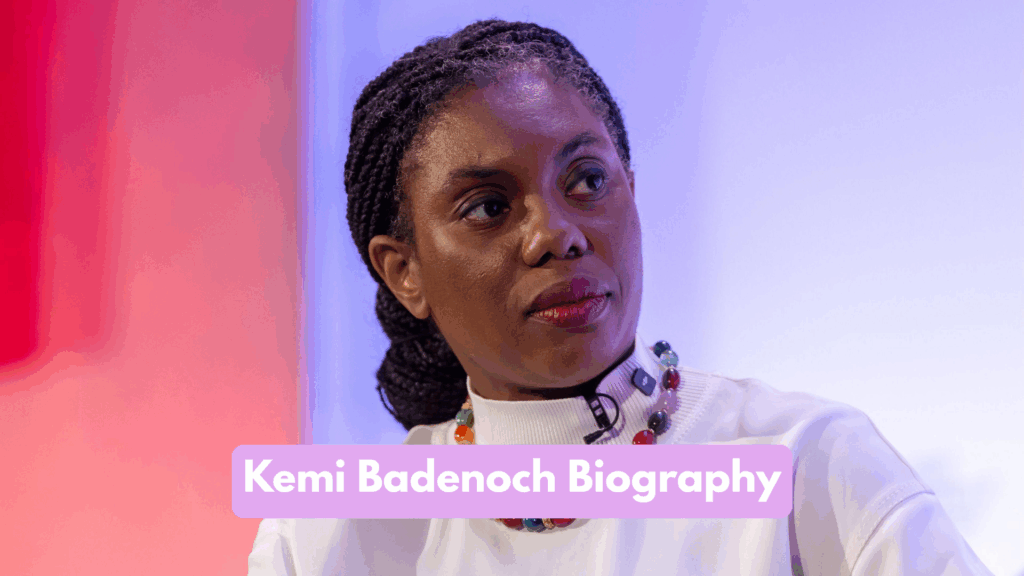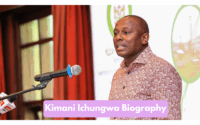Kemi Badenoch Biography: Politics, Wikipedia, Religion, News, Husband, Family, Net Worth

Kemi Badenoch is a prominent British politician who rose rapidly through the Conservative Party ranks to become its leader and Leader of the Opposition.
Her story — born in London, raised partly in Nigeria and later returning to the UK — has shaped her politics, public profile and reputation as a plain-spoken commentator on culture and policy.
Early life and family
Olukemi Olufunto “Kemi” (née Adegoke) was born on 2 January 1980 in Wimbledon, London; soon after her birth her family returned to Nigeria, where she spent much of her childhood. Her parents worked in professional fields — her father as a doctor and later a publisher and activist, and her mother as an academic — and Badenoch has described a mixed middle-class upbringing that included periods of hardship. She moved back to the UK at 16.
Education
Badenoch studied Computer Systems Engineering at the University of Sussex (MEng), later completing a part-time law degree (LLB) at Birkbeck, University of London while she worked. Her technical and legal training preceded a transition into finance, consultancy and then politics.
Early career (IT, finance, media)
After university she worked in information technology (including a role as a software engineer), then moved into financial services and consultancy roles — notably at Coutts — and had a stint in digital roles in media. Those professional experiences informed her approach to tech, business and regulation once she entered government.
Entry into politics and parliamentary rise
Badenoch joined the Conservative Party in the mid-2000s and first stood for Parliament in 2010. She was selected for and won the Saffron Walden seat at the 2017 general election, entering the House of Commons as an MP. Boundary changes later led to her standing (and winning) in the reconfigured North West Essex constituency. Over the years she developed a reputation for directness and for campaigning on integration, free speech and economic opportunity.
Government roles and ministerial career
Kemi Badenoch held a range of government positions across Conservative administrations. She served in junior ministerial roles (for example at the Department for Education and the Treasury), and later rose to higher office:
- Secretary of State for International Trade and President of the Board of Trade (from September 2022).
- Minister for Women and Equalities (from October 2022).
- Secretary of State for Business and Trade (after a department reshuffle in February 2023).
These roles placed her at the center of post-Brexit trade negotiations and business policy.
2022 leadership bid and national profile
Following the resignation of Boris Johnson in 2022, Badenoch launched a leadership campaign that raised her national profile as a “straight-talking” conservative voice. Although she did not win that contest, the campaign cemented her reputation as an influential figure on the Tory right and raised her visibility across the country.
Leadership of the Conservative Party (2024–)
After the 2024 general election and party turbulence, Badenoch stood in the 2024 Conservative leadership contest and was elected leader of the Conservative Party, becoming the first Black woman to lead a major UK political party. With that victory she also became Leader of the Opposition. Her leadership has focused on party renewal, hawkish stances on immigration and debates around national identity and culture.
Political views and public controversies
Badenoch is known for challenging what she calls “woke” culture and for advocating stronger integration measures for immigrants, a cultural emphasis on British values and a market-oriented approach to economic policy. Her time in ministerial office attracted both praise for energy in trade and business files and criticism — including reports of staff complaints and accusations of a combative style — which she has publicly denied.
Personal life
Kemi Badenoch is married and has children. She has spoken publicly about personal health challenges and life moments — which have occasionally become part of media profiles — and describes herself culturally as a Christian while identifying more with an agnostic worldview in personal faith.
Timeline — key dates at a glance
- 1980 — Born in Wimbledon, London.
- ~1996 — Returned to the UK at age 16.
- 2003 — Completed MEng in Computer Systems Engineering (University of Sussex).
- 2009 — Graduated LLB, Birkbeck, University of London.
- 2017 — Elected MP for Saffron Walden (later re-elected for North West Essex after boundary changes).
- 2022–2024 — Held senior ministerial roles including Secretary of State for International Trade and Secretary of State for Business and Trade.
- Nov 2024 — Elected leader of the Conservative Party and became Leader of the Opposition.
Achievements & influence
Badenoch’s fast rise from a junior minister to a cabinet post and then party leader underscores her organisational skills, media savvy and ability to mobilise a particular conservative coalition. She is frequently cited in debates on culture wars, trade policy and regulatory reform, and remains a polarising but pivotal figure in modern British politics.
Frequently Asked Questions (FAQs)
Q: When and where was Kemi Badenoch born?
A: She was born on 2 January 1980 in Wimbledon, London.
Q: What is Kemi Badenoch’s educational background?
A: She earned an MEng in Computer Systems Engineering from the University of Sussex and later completed an LLB at Birkbeck, University of London.
Q: Which constituency does she represent?
A: She was MP for Saffron Walden (2017–2024) and, after boundary changes, for North West Essex (from 2024).
Q: What ministerial roles has she held?
A: She has held several roles including Secretary of State for International Trade, Minister for Women and Equalities, and Secretary of State for Business and Trade.
Q: Is Kemi Badenoch the Conservative Party leader?
A: Yes — she was elected leader of the Conservative Party in November 2024 and serves as Leader of the Opposition.
Conclusion
Kemi Badenoch’s biography is a study in rapid political ascent: technical education, commercial experience, a steady climb through parliamentary roles and a relatively swift arrival at party leadership. Whether admired for her clarity and drive or criticised for a confrontational style, she is an influential voice shaping current UK political debates on trade, national identity and public policy. For readers tracking British politics, her decisions and leadership direction will be central to the Conservative Party’s fortunes in coming years.


